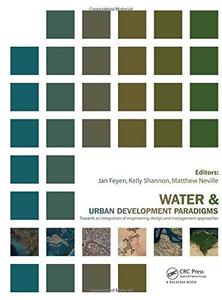
Free Download Water and Urban Development Paradigms: Towards an Integration of Engineering, Design and Management Approaches By Jan Feyen (editor), Kelly Shannon (editor), Matthew Neville (editor)
2008 | 712 Pages | ISBN: 0415483344 | PDF | 17 MB
Communication across and integration of disciplines in the urban-water sector seems today more imperative than ever before. Water is a strategic and shrinking resource. It is probably the world's most valuable resource and clean water has even been touted as the 'next oil'. Control of water- from access to management - has always been a highly politicised affair. The complexities that surround it are proving to be major challenges as the world continues to urbanise and human habits of mass consumption and pollution deplete natural resources and destroy natural eco-systems. Water issues are increasingly high on the international agenda â€" particularly in desert, tropical and sub-tropical regions. Water and Urban Development Paradigms includes the papers presented at the International Conference on Water and Urban Development Paradigms: Towards an Integration of Engineering, Design and Management Approaches (Leuven, Belgium, 15-19 September 2008), and intends to bridge the gap between the disciplines of water management, ecology and the approaches of engineering, urban design and spatial planning. The volume explores a number of themes, discussing the historical relationship between water systems and human settlements, and related management problems regarding urban floods, water use and water sanitation. The aim of Water and Urban Development Paradigms is to contribute to the better integration of approaches currently considered in the separate disciplines of water management, water engineering, urban planning and design, and aquatic ecology- and lead to the emergence of new, more effective water and urban development paradigms. The book will be of special interest to scientists and professionals in the fields of architecture, urban planning, water resources engineering, water supply and sanitation, flood protection, among related fields; to public and non-governmental organizations active in urban planning and the water sector, and to university teachers and students in architecture, urbanism and planning, water and sanitation engineering.
